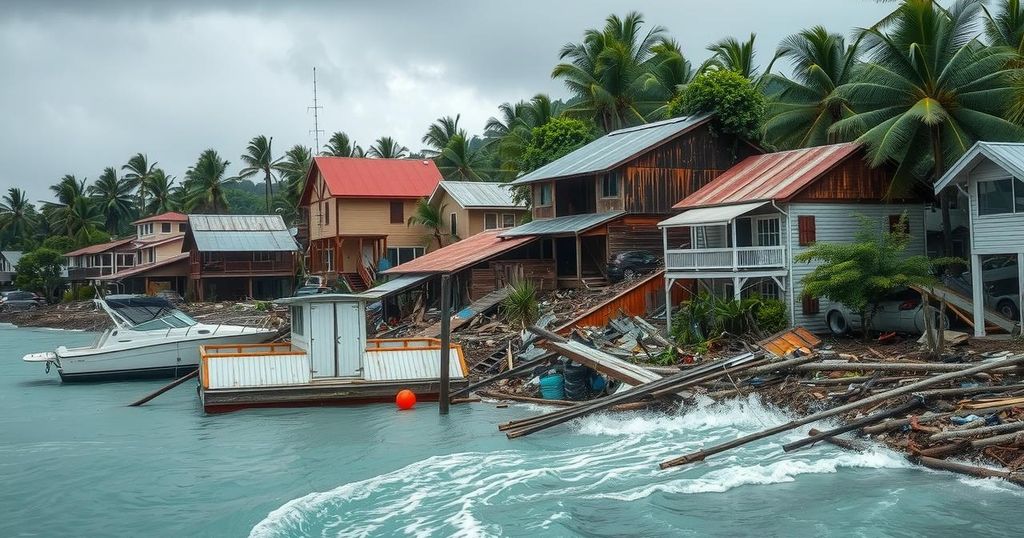Cyclone Chido Causes Catastrophic Damage in Mayotte with Possible High Casualty Rate

Mayotte is reeling from the devastation caused by Cyclone Chido, described by residents as akin to an atomic bomb. The cyclone’s impact has flattened neighborhoods, caused extensive damage to infrastructure, left at least 14 confirmed dead, and may result in a significantly higher death toll. Rescue efforts are hindered by harsh conditions and communication failures, with international aid beginning to arrive as locals face dire situations.
Mayotte has suffered catastrophic destruction following the passage of Cyclone Chido, a category 4 storm that struck on December 15, 2024, with wind speeds exceeding 220 kilometers per hour (136 miles per hour). Local residents have remarked on the overwhelming devastation, with Bruno Garcia, a hotel owner, stating, “It’s as if an atomic bomb fell on Mayotte.” The cyclone has led to widespread damage across the archipelago, affecting homes, schools, and critical infrastructure while severely disrupting communication and rescue operations. Official reports indicate at least 14 confirmed fatalities, yet local leaders warn that the total death toll could range from hundreds to potentially thousands as recovery efforts continue and conditions remain dire.
The cyclone has particularly devastated informal settlements, where many of the island’s undocumented migrants reside. This demographic, estimated at around 100,000, has suffered the brunt of the storm’s impact. Authorities face significant challenges in assessing the full extent of the destruction, as a substantial portion of the island remains unreachable, complicating rescue operations. Estelle Youssouffa, a local parliament member, noted that entire neighborhoods have been “razed,” emphasizing the severity of the situation.
International aid is beginning to arrive as authorities mobilize resources for emergency relief, with thousands of rescuers dispatched from mainland France and nearby territories. Reports indicate that basic utilities such as electricity and water have been largely disrupted, leaving many locals stranded without vital services. The government’s response is under scrutiny as the situation develops, and discussions surrounding climate change’s role in exacerbating such cyclones continue among scientists and policymakers.
Mayotte, an archipelago located in the Indian Ocean, is a French overseas territory that experiences severe weather conditions, especially during cyclone season from mid-November to the end of April. The recent Cyclone Chido is the most powerful to hit Mayotte in nearly a century, prompting concerns over the vulnerability of the region due to climate change, which is believed to enhance the intensity and frequency of such storms. The island, home to a significant number of undocumented migrants seeking better opportunities, faces compounded humanitarian challenges amidst rising economic difficulties and infrastructure inadequacies.
The impact of Cyclone Chido on Mayotte highlights the region’s vulnerability to extreme weather and the urgent need for effective disaster response measures. Estimates suggest that recovery from this disaster will entail extensive intervention from both national and international resources, as the local population faces unprecedented challenges in terms of loss and humanitarian needs. For Mayotte, which is already grappling with socio-economic issues, the cyclone exacerbates existing vulnerabilities, necessitating urgent and effective planning for recovery and resilience against future climatic events.
Original Source: www.accuweather.com






